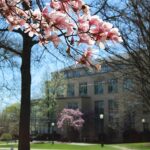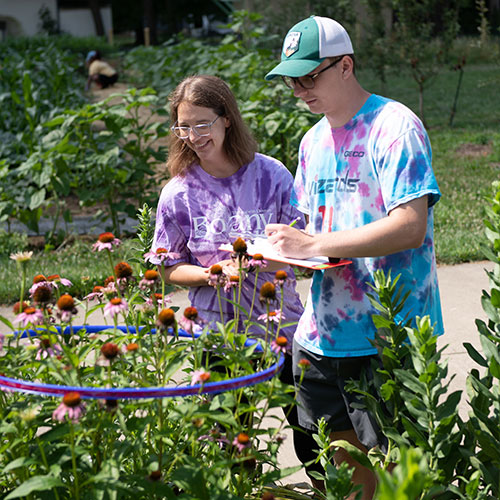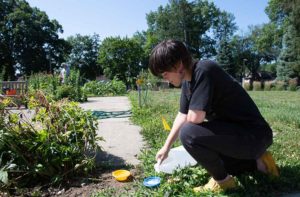
Interdisciplinary collaboration across campus attains Bee Campus USA affiliation for Wooster

Thanks to the interdisciplinary collaboration and work of students, faculty, and staff in The College of Wooster’s biology, environmental studies, and campus grounds departments, the College has become a certified affiliate of the Bee Campus USA program. Designed by the Xerces Society for Invertebrate Conservation the program champions the strengths of educational campuses that benefit pollinators responsible for supporting flowering plants and crops.
“Insect pollinators are in decline, and faculty, students, and staff are focused on how we can support bee diversity.” said Jennifer Ison, associate professor of biology. “Receiving Bee Campus USA certification from the Xerces Society helps showcase our efforts and bring attention to both the problem of bee decline and what Wooster is doing to support bees on campus.”
With the support of the campus grounds department and through experiential learning courses, Independent Study and other student research, the College established two pollinator plots on campus over the last few years including a larger one in the learning garden location on College Avenue and another near the newest learning garden on Pine Street. Inspiration for the project was drawn from student proposals written in a Plant-Insect Interactions course in 2019 on how to support bees on campus, and multiple courses on campus continue to be involved. A grant from the Hamburger Endowment for Collaborative Projects and Program Development allowed Ison, associate professor Matt Mariola and assistant professor Carlo Moreno from the environmental studies department, and Phil Olsen, manager of campus grounds, to establish the plots as part of a movement to increase native plants on campus.
Funds from the Hamburger Endowment supported the work of Miyauna Incarnato ’21, an environmental studies I.S. student who helped establish the plot and compared its bee diversity to pollinator planting areas at Holden Arboretum, Secrest Arboretum, and Wooster Memorial Park. Other student I.S. research in the plots includes examining how honeybees compete with native bees, most recently by Matthew Pardi ’23, and even a creative look at the honeybee waggle dance by Katie Spence ’23, a biology and theatre & dance major.
“Pollinators are integral to ecosystems and agricultural production across the world, and the pollinator plots give me an opportunity to observe them right here on campus,” said Pardi, a biology major. “Between problem solving in my research or learning to identify new bees, flowers, and insects, there is always something new to see. I leave every day with a little more knowledge and come back the next morning excited.”
Along with other students from last fall’s Field Botany course, Ash Arons ’23, who first worked on the project as a sophomore research assistant, created a companion website that shares details on the two main plots, the importance of pollinators, a blog about ongoing work with bees, other pollinators, and within the gardens, and even some plant haikus. The team is also working to create physical interpretive signs for each plot to help educate visitors on campus about pollinator conservation. According to the website, native plants like those in these plots give pollinators the habitat and resources needed to help the ecosystem flourish and grow. Education also supports movements that stop pesticide use and habitat destruction.
 “Bee Campus USA emphasizes aiding solitary native bees (over 500 species in Ohio alone) as opposed to promoting the typical honeybee (Apis mellifera) propaganda often seen on popular media,” said Arons, an environmental studies major with an emphasis in environmental conservation. “This next step in our project opens access to a plethora of resources. Wooster will be featured alongside other environmentally focused colleges across the nation and be welcomed into that network. While the College is already implementing mindful planting practices across campus, I am excited for the prospect of continual growth that this partnership will hold us accountable for.”
“Bee Campus USA emphasizes aiding solitary native bees (over 500 species in Ohio alone) as opposed to promoting the typical honeybee (Apis mellifera) propaganda often seen on popular media,” said Arons, an environmental studies major with an emphasis in environmental conservation. “This next step in our project opens access to a plethora of resources. Wooster will be featured alongside other environmentally focused colleges across the nation and be welcomed into that network. While the College is already implementing mindful planting practices across campus, I am excited for the prospect of continual growth that this partnership will hold us accountable for.”
In addition to student research opportunities, students learn about pollinators and insect conservation through courses that use the gardens as teaching tools. Multiple courses at Wooster in biology and environmental studies cover insect pollination, and this fall Ison and Moreno are discussing combining sections of a first-year seminar courses for a cross-section project on the pollinator plots. Ison’s FYS course covers plant appreciation and Moreno’s insects and society. Mariola’s Gardening Practicum course also works in the College learning garden, placed near the pollinator garden on Pine Street to increase pollination within the learning garden.
Bee Campus USA is an initiative of the Xerces Society for Invertebrate Conservation, a nonprofit organization based in Portland, Oregon, with offices across the country. The organization’s mission is to galvanize communities and campuses to sustain pollinators by providing them with a healthy habitat, rich in a variety of native plants, and free of pesticides. Pollinators like bumble bees, sweat bees, mason bees, honeybees, butterflies, moths, beetles, flies, hummingbirds, and many others are responsible for the reproduction of almost ninety percent of the world’s flowering plant species and one in every three bites of food we consume.
Photo 1: Ison and Pardi study the pollinator garden on Pine Street.
Photo 2: Arons captures bees in the Pine Street Garden.
Posted in News on July 18, 2022.
Related Posts
Related Areas of Study
Environmental Communication & Action
Explore ways to effect change in environmental policies through communication and activism
PathwayEnvironmental Studies
Natural sciences, social sciences, and humanities courses combine for those who want to be part of environmental solutions
Major MinorBiology
Explore molecular and cellular biology, ecology and more with top faculty and access to extensive lab facilities.
Major Minor

